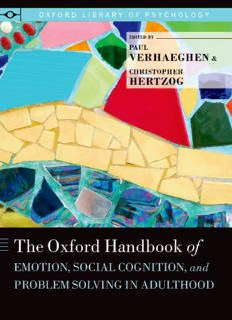Table Of ContentThe Oxford Handbook of Emotion, Social Cognition,
and Problem Solving in Adulthood
OXFORD LIBRARY OF PSYCHOLOGY
editor-in-chief
Peter E. Nathan
Area Editors:
Clinical Psychology
David H. Barlow
Cognitive Neuroscience
Kevin N. Ochsner and Stephen M. Kosslyn
Cognitive Psychology
Daniel Reisberg
Counseling Psychology
Elizabeth M. Altmaier and Jo-Ida C. Hansen
Developmental Psychology
Philip David Zelazo
Health Psychology
Howard S. Friedman
History of Psychology
David B. Baker
Methods and Measurement
Todd D. Little
Neuropsychology
Kenneth M. Adams
Organizational Psychology
Steve W. J. Kozlowski
Personality and Social Psychology
Kay Deaux and Mark Snyder
Ox fOr d l i b r a ry Of p s y c hOlOg y
peter e. nathan
Editor in Chief
The Oxford Handbook
of Emotion, Social
Cognition, and
Problem Solving in
Adulthood
Edited by
Paul Verhaeghen and
Christopher Hertzog
1
1
Oxford University Press is a department of the University of Oxford.
It furthers the University’s objective of excellence in research, scholarship,
and education by publishing worldwide.
Oxford New York
Auckland Cape Town Dar es Salaam Hong Kong Karachi
Kuala Lumpur Madrid Melbourne Mexico City Nairobi
New Delhi Shanghai Taipei Toronto
With offices in
Argentina Austria Brazil Chile Czech Republic France Greece
Guatemala Hungary Italy Japan Poland Portugal Singapore
South Korea Switzerland Thailand Turkey Ukraine Vietnam
Oxford is a registered trademark of Oxford University Press
in the UK and certain other countries.
Published in the United States of America by
Oxford University Press
198 Madison Avenue, New York, NY 10016
© Oxford University Press 2014
All rights reserved. No part of this publication may be reproduced, stored in a
retrieval system, or transmitted, in any form or by any means, without the prior
permission in writing of Oxford University Press, or as expressly permitted by law,
by license, or under terms agreed with the appropriate reproduction rights organization.
Inquiries concerning reproduction outside the scope of the above should be sent to the
Rights Department, Oxford University Press, at the address above.
You must not circulate this work in any other form
and you must impose this same condition on any acquirer.
Library of Congress Cataloging-in-Publication Data
The Oxford handbook of emotion, social cognition, and problem solving in adulthood / edited by Paul Verhaeghen
and Christopher Hertzog.—1 Edition.
pages cm.—(Oxford library of psychology)
Includes bibliographical references and index.
ISBN 978–0–19–989946–3
1. Emotions. 2. Social perception. 3. Problem solving. I. Verhaeghen, Paul, editor. II. Hertzog, C. K. (Christopher K.),
1952– editor.
BF511.O94 2014
153—dc23
2013048666
9 7 8 6 5 4 3 2 1
Printed in the United States of America
on acid-free paper
This book is in memory of Fredda Blanchard-Fields:
Passionate colleague, dedicated researcher, and inexhaustible font of positive energy
short contents
Oxford Library of Psychology ix
About the Editors xi
Contributors xiii
Table of Contents xvii
Chapters 1—320
Index 321
vii
oxford Library of PsychoL ogy
The Oxford Library of Psychology, a landmark series of handbooks, is published by
Oxford University Press, one of the world’s oldest and most highly respected pub-
lishers, with a tradition of publishing significant books in psychology. The ambi-
tious goal of the Oxford Library of Psychology is nothing less than to span a vibrant,
wide-ranging field and, in so doing, to fill a clear market need.
Encompassing a comprehensive set of handbooks, organized hierarchically, the
Library incorporates volumes at different levels, each designed to meet a distinct
need. At one level are a set of handbooks designed broadly to survey the major sub-
fields of psychology; at another are numerous handbooks that cover important cur-
rent focal research and scholarly areas of psychology in depth and detail. Planned
as a reflection of the dynamism of psychology, the Library will grow and expand as
psychology itself develops, thereby highlighting significant new research that will
impact on the field. Adding to its accessibility and ease of use, the Library will be
published in print and, later on, electronically.
The Library surveys psychology’s principal subfields with a set of handbooks
that capture the current status and future prospects of those major subdisciplines.
This initial set includes handbooks of social and personality psychology, clinical
psychology, counseling psychology, school psychology, educational psychology,
industrial and organizational psychology, cognitive psychology, cognitive neuro-
science, methods and measurements, history, neuropsychology, personality assess-
ment, developmental psychology, and more. Each handbook undertakes to review
one of psychology’s major subdisciplines with breadth, comprehensiveness, and
exemplary scholarship. In addition to these broadly-conceived volumes, the Library
also includes a large number of handbooks designed to explore in depth more spe-
cialized areas of scholarship and research, such as stress, health and coping, anxiety
and related disorders, cognitive development, or child and adolescent assessment.
In contrast to the broad coverage of the subfield handbooks, each of these latter
volumes focuses on an especially productive, more highly focused line of scholar-
ship and research. Whether at the broadest or most specific level, however, all of the
Library handbooks offer synthetic coverage that reviews and evaluates the relevant
past and present research and anticipates research in the future. Each handbook in
the Library includes introductory and concluding chapters written by its editor to
provide a roadmap to the handbook’s table of contents and to offer informed antici-
pations of significant future developments in that field.
An undertaking of this scope calls for handbook editors and chapter authors
who are established scholars in the areas about which they write. Many of the
ix
Description:Over the last decade, the field of socio-emotional development and aging has rapidly expanded, with many new theories and empirical findings emerging. This trend is consistent with the broader movement in psychology to consider social, motivational, and emotional influences on cognition and behavior

